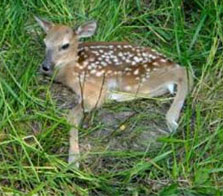
The Department of Natural Resources does not provide services for orphaned or injured wildlife. If necessary, you can contact permitted wildlife rehabilitator or allow nature to take its course. Permitted wildlife rehabilitators make the final decision on their ability to help; therefore, you should make arrangements with them BEFORE getting involved with orphaned or injured wildlife. The goal of wildlife rehabilitation is to release wildlife back into the wild.
For more information, contact the Department of Natural Resources at 317-232-4200or dfw@dnr.IN.gov. If you are having issues with wildlife causing damage or posing a safety concern, please visit the Living with Wildlife page.
Adult animals rarely abandon their young. What may seem like an abandoned young animal is normal care for most species. The animal may not benefit from your help.
- The adult may be out of sight gathering food.
- Removing young from their nests can disrupt the reproductive cycle of the animal.
- Wildlife carry diseases and parasites that can be transmitted to humans and pets.
- Human scent can alert predators to the presence of young animals.
- Truly orphaned and injured wildlife can be given to a permitted wildlife rehabilitator for care.
Before acting, ask:
- Has sufficient time passed without an adult animal nearby? Some animals check their young at night and may be secretive in checking their young. The adult animal will not return with a person nearby.
- Does the animal really need help? Most young animals that seem abandoned do NOT need help.
- Did I witness the mother get killed?
- Does the animal have obvious signs of disease or injury? Signs may include obvious signs of wounds or injuries, the young being covered in large numbers of insects, breathing issues, and diarrhea.
- Will I help or harm this animal?
The best care and chance of survival is always with the young animal’s mother.
It is unlawful for an individual to possess a wild animal without a proper permit. Good intentions can still harm wildlife. If an animal does need assistance, it is important that a properly permitted professional is contacted. Professionals have training, facilities, and resources to properly assist wildlife and ensure the animal can fend for itself when released.
Most animals found in the wild are regulated by the DNR. If an animal is injured, you may call a permitted rehabilitator for assistance. Never compromise personal safety to help wildlife. You can find a list of permitted rehabilitators here. Wild animal rehabilitation permits are issued to qualified individuals who take in sick, injured, or orphaned wild animals with the intent of releasing them back into the wild.
Leave Fawns Be
In April 2024, Indiana detected its first positive case of chronic wasting disease (CWD).
CWD is a fatal infectious disease that affects white-tailed deer. It is contagious among deer and is spread through direct contact, contaminated environments, and bodily fluids. Fawns can also spread CWD, so leaving them be helps prevent CWD from moving to new areas.
Help prevent the spread of CWD:
- Fawns found in LaGrange, Steuben, DeKalb, or Noble counties can only be given to a permitted rehabilitator in that four-county area.
- For the first few weeks of life, fawns often hide by themselves and stay motionless while their mother is looking for food.
- Confirm that a fawn is truly injured or orphaned before acting. Signs that a fawn may need a rehabilitator include witnessing the mother die, obvious signs of injury, the fawn being covered in large amounts of insects, and frequent calling for its mother. Confirm a rehabilitator can help a fawn before intervening.
- Consider letting the circle of life take its course on an injured fawn, as difficult as that may be. Sometimes wildlife can survive even when that potential is not immediately apparent.
Don’t request removal of dead animals
The Orphaned & Injured Wildlife page is not intended for collecting information on roadkill nor does it provide for the removal of dead animals.
- Contact Indiana Department of Transportation regarding the collection of roadkill on state and federal highways. Local public works or sanitation departments collect wildlife killed on their own streets.
- For removal of dead wildlife from private property, contact a wildlife control operator or remove the dead wildlife yourself. All operators name their own rates and fees. Wear gloves, double-bag small animals in plastic bags or garbage bags, and dispose of them in the trash. In Indiana, other disposal options include burial, incineration, rendering, and composting.
